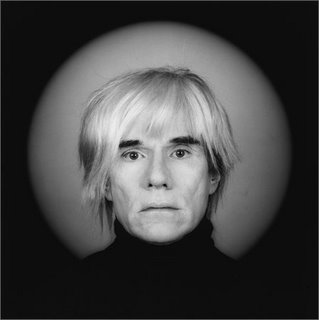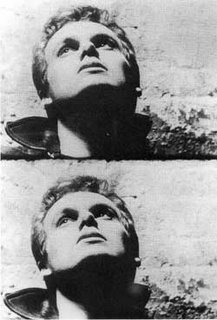 Over the past two nights, I sat happily absorbed, enlightened, and often mentally stimulated by Ric Burns' outstanding documentary ANDY WARHOL: A DOCUMENTARY FILM on our local PBS affiliate. Unlike other documentaries on the subject, Burns had the courage to focus on the art Warhol left behind, rather than his cultural impact and cult cachet, and it paid off in one of the most powerful and articulate vindications of contemporary art by any artist I've seen or read.
Over the past two nights, I sat happily absorbed, enlightened, and often mentally stimulated by Ric Burns' outstanding documentary ANDY WARHOL: A DOCUMENTARY FILM on our local PBS affiliate. Unlike other documentaries on the subject, Burns had the courage to focus on the art Warhol left behind, rather than his cultural impact and cult cachet, and it paid off in one of the most powerful and articulate vindications of contemporary art by any artist I've seen or read.It's rare to see something like Burns' film, which naturally makes you melancholy because Warhol was dead by the time he was 58 and because there's no one quite like him in our world today, but which provokes joy by virtue of the sheer bravado of its intelligent argument and defense. What is art? One valid answer of many: Art is something important enough to provoke mindful and heartfelt responses like this. I think we all agree that our world is becoming less encouraging and supportive of artists, which is surely our damnation, but as long as art can be discussed in public forums on this level, it's not dead and certainly not irrelevant. Burns' handling of this life and material I found personally inspiring; it gave me an idea for an article I'd like to write, offering a Warholian reading of a certain movie. (Along these same lines, check out Amy Taubin's article in the current FILM COMMENT about David Cronenberg's audio guide to a recent Toronto retrospective of Warhol's "Death and Disaster" paintings -- good stuff.)
All plaudits to PBS for presenting this two-part program, but on the other hand, all shame on PBS for the way they presented it. Each of the two segments ended with important documentary footage of Warhol himself being interviewed, which almost packed an element of surprise since such footage was deliberately used sparingly during the program itself. But shortly after the subject of the preceeding two hours began to talk, PBS shrank the screen to occupy the right side of the screen only and cut the sound off! -- the better to run advertisements on the left side of the screen, selling the DVD and soundtrack CD (not mentioning that neither will be available till the end of October), promoting the next night's programming, and acknowledging Rosalind P. Walter and all the other PBS members whose contributions helped to make this butchered programming possible.
 Yes, "butchered." As became even more apparent in Part 2, Burns' film was also compromised in terms of content censorship -- censoring not only Burns, but Warhol's art itself. In a discussion of the short film "Blow Job" (1963, pictured), the title of the film was excised from the soundtrack though a brief section of the film itself (observing the ecstatic face of the recipient) was shown. One film clip featured digitally obscured nudity, and some profanity used by the onscreen commentators was also bleeped. To encounter these sheepish counter-maneuvers in the midst of such intelligent discussion made me feel increasingly ashamed to be an adult member of PBS's viewing audience.
Yes, "butchered." As became even more apparent in Part 2, Burns' film was also compromised in terms of content censorship -- censoring not only Burns, but Warhol's art itself. In a discussion of the short film "Blow Job" (1963, pictured), the title of the film was excised from the soundtrack though a brief section of the film itself (observing the ecstatic face of the recipient) was shown. One film clip featured digitally obscured nudity, and some profanity used by the onscreen commentators was also bleeped. To encounter these sheepish counter-maneuvers in the midst of such intelligent discussion made me feel increasingly ashamed to be an adult member of PBS's viewing audience.When PBS was first formed in the early 1970s, it was an oasis where open-minded viewers could turn to see and hear what was happening within our culture, and within the counter-culture, without the usual network restraints. Something terrible happened along the way, and this principle evidently no longer exists as a hallmark of PBS, so don't believe those membership drive pitches ("Join now for $25... or if you join at our Elite rate of $150, we'll send you this DVD of the show you've just burned to your hard drive!") when they tell you that PBS is any different than any other network; it may be public-owned, but it's no longer public-serving. If PBS can no longer be trusted to speak without shame and self-consciousness where some of the greatest art of the 20th century is concerned, we should turn our back on it and say Hallelujah for cable. After all, this Warhol documentary isn't a place where kids are going to flock in search of porn; that place is called the Internet. And if kids happen to be watching and learning something from this documentary, for God's sake, let them do so -- better in an open arena of enlightened, non-exploitative discussion, than in some shame-fostering dot-com smegma pit.
As a DVD label, however, there may still some use for PBS. By going to their website, you can pre-order ANDY WARHOL: A DOCUMENTARY FILM on disc -- which I assume will be presented uncut, in a manner suitable for people old enough to at least have fake ID. For a taste of what to expect, be on the lookout for replays of the program on your own local PBS affiliate, but don't encourage their censorious ways by sending them money. Patrons of the Arts should send their Andy-loving money directly to Ric Burns, who I understand is still about $25,000 in the red with this admirable production.